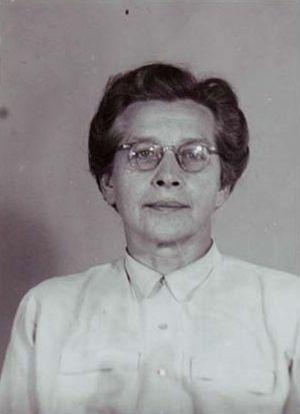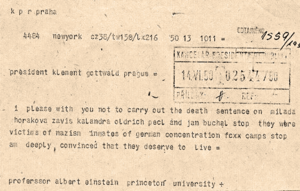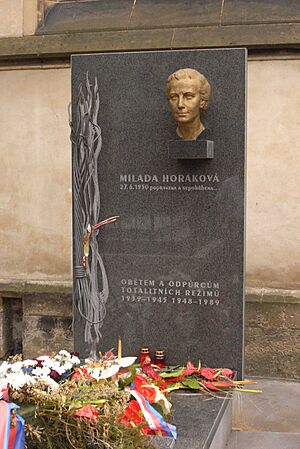Milada Horáková facts for kids
Quick facts for kids
Milada Horáková
|
|
|---|---|
 |
|
| Personal details | |
| Born |
Milada Králová
25 December 1901 Prague, Austria-Hungary |
| Died | 27 June 1950 (aged 48) Prague, Czechoslovak Socialist Republic |
| Cause of death | Hanging |
| Political party | ČSNS |
| Children | Jana Kanská |
| Alma mater | Charles University |
| Occupation | lawyer, politician |
| Awards | Order of Tomáš Garrigue Masaryk Order of the White Double Cross |
Milada Horáková (born Milada Králová, 25 December 1901 – 27 June 1950) was a brave Czech politician. She was also part of a secret group that fought against the government during World War II. Later, she was wrongly accused of crimes and executed by the country's Communist Party.
Many famous people around the world, like Albert Einstein and Winston Churchill, asked for her life to be spared. But their pleas were not heard. She was executed in Prague and her body was never found.
Years later, in 1968, the decision to convict her was cancelled. In the 1990s, she was fully cleared of all charges. She also received two important awards after her death: the Order of Tomáš Garrigue Masaryk and the Order of the White Double Cross.
Contents
Early Life
Milada Horáková was born Milada Králová in Prague. When she was 17, during the last year of the First World War, she was sent away from school. This happened because she took part in a protest against the war.
She finished her studies in the new country of Czechoslovakia. Then she studied law at Charles University and graduated in 1926. A senator named Františka Plamínková, who started the Women's National Council, greatly influenced her early political ideas.
Milada married Bohuslav Horák in 1927. Their daughter, Jana, was born in 1933.
From 1927 to 1940, Milada worked for the Prague city government. She helped with social issues and became a strong supporter of equal rights for women. She also worked with the Czechoslovak Red Cross. In 1929, she joined the Czechoslovak National Social Party. Even though its name sounds similar, this party was strongly against German National Socialism (Nazism).
Fighting for Freedom
After Germany took over Czechoslovakia in 1939, Milada Horáková joined a secret group. This group worked against the German occupation. In 1940, she and her husband were arrested by the Gestapo, which was the German secret police. She was arrested because of her political work before the war.
She was sent to a prison camp called Terezín. After that, she was moved to different prisons in Germany.
In 1944, Milada Horáková went to court in Dresden. The people prosecuting her wanted her to be sentenced to death. But she was given an 8-year prison sentence instead. In April 1945, American soldiers freed her from prison in Bavaria. This happened near the end of Second World War.
Back in Politics
After Czechoslovakia was freed in 1945, Milada Horáková went back to Prague. She joined the leaders of her political party, the Czechoslovak National Social Party, which had started up again. She became a member of the country's temporary parliament. In 1946, she won a seat in the elected parliament. She represented the area of České Budějovice in southern Bohemia.
Her political work again focused on helping women have a bigger role in society. She also worked to protect Czechoslovakia's democratic government. In February 1948, the Communist Party took control of the government. Soon after, she left parliament to protest this change.
Many of her political friends left Czechoslovakia and went to Western countries. But Milada Horáková chose to stay in Prague. She continued to be active in politics. On 27 September 1949, she was arrested. She was accused of leading a secret plan to overthrow the Communist government.
Unfair Trial and Execution
Before her trial, Milada Horáková and the others arrested with her were questioned very intensely. This was done by the StB, the Czechoslovak state security police. She was accused of leading a plot to commit treason and spy for the United States, Great Britain, France, and Yugoslavia.
One piece of "evidence" was that she attended a meeting in September 1948. At this meeting, political figures from different parties discussed how to respond to the new Communist government. She was also accused of talking to Czechoslovak politicians who had left the country.
The trial of Horáková and twelve of her friends started on 31 May 1950. This trial was set up to be a "show trial". This means the outcome was decided beforehand, much like unfair trials in the Soviet Union in the 1930s. Soviet advisors helped supervise the trial. The Communist government also ran a public campaign. This campaign demanded that the accused be sentenced to death.
The main prosecutor was Dr. Josef Urválek, and Ludmila Brožová-Polednová was also a prosecutor. The trial was carefully planned, and the accused were forced to confess to crimes they didn't commit.
A recording of the trial was found in 2005. It showed how bravely Milada Horáková defended her political beliefs. She spoke about the values of Czechoslovakia's democratic presidents, Tomáš Garrigue Masaryk and Edvard Beneš. She famously said that "no-one in this country should be put to death or be imprisoned for their beliefs."
Milada Horáková was sentenced to death on 8 June 1950. Three other people were also sentenced to death: Jan Buchal, Oldřich Pecl, and Záviš Kalandra. Many important people around the world asked for her life to be saved. These included scientist Albert Einstein, former British Prime Minister Winston Churchill, French President Vincent Auriol, and former US First Lady Eleanor Roosevelt. But the sentences were not changed. Milada Horáková was executed by hanging in Prague's Pankrác Prison on 27 June 1950. She was 48 years old.
After her execution, Milada Horáková's body was cremated. But her ashes were never given back to her family. No one knows where they are.
Other People in the Trial
- Jan Buchal (1913–1950), a State Security officer (executed)
- Vojtěch Dundr (1879–1957), a former Secretary of the Czech Social Democratic Party (sentenced to 15 years)
- Dr. Jiří Hejda (1895–1985), a former factory owner (sentenced to life imprisonment)
- Dr. Bedřich Hostička (1914–1996), a Secretary of the Czechoslovak People's Party (sentenced to 28 years)
- Záviš Kalandra (1902–1950), a journalist (executed)
- Antonie Kleinerová (1901–1996), a former member of Parliament (sentenced to life imprisonment)
- Dr. Jiří Křížek (1895–1970), a lawyer (sentenced to 22 years)
- Dr. Josef Nestával (1900–1976), an administrator (sentenced to life imprisonment)
- Dr. Oldřich Pecl (1903–1950), a former mine owner (executed)
- Professor Dr. Zdeněk Peška (1900–1970), a university professor (sentenced to 25 years)
- František Přeučil (1907–1996), a publisher (sentenced to life imprisonment)
- Fráňa Zemínová (1882–1962), an editor and former member of Parliament (sentenced to 20 years)
Honored and Remembered
The court's decision was cancelled in June 1968 during a time called the Prague Spring. But Soviet forces then took over Czechoslovakia, stopping the process of clearing her name. Her full rehabilitation was not completed until after the Velvet Revolution in 1989.
In 1990, a main street in Prague was renamed in her honor. In 1991, she was given the Order of Tomáš Garrigue Masaryk (1st Class) after her death. June 27, the day she was executed, is now called "Commemoration Day for the Victims of the Communist Regime" in the Czech Republic.
On 11 September 2008, Ludmila Brožová-Polednová, who was one of the prosecutors in Horáková's trial, was sentenced to six years in prison. She was sentenced for her role in the unfair trial and execution of Milada Horáková. Brožová-Polednová was released in December 2010 because of her age and health. She passed away in 2015.
In January 2020, Milada Horáková was given another award after her death: the Order of the White Double Cross (1st Class). The award was given by the Slovak president, Zuzana Čaputová.
Her Family
Milada Horáková's husband, Bohuslav Horák, was not arrested in 1949. He escaped to West Germany and later moved to the United States. Their daughter, Jana, was 16 when her mother was executed. Her aunt raised her. Jana could not join her father in the US until 1968. There, she started her own family and had three grandchildren.
Milada Horáková's last letters, including those to her husband and daughter, have been published.
About the Film
Milada is a Czech-American movie about Milada Horáková's life. It was released in November 2017. The actress Ayelet Zurer plays Milada Horáková. The movie was directed by David Mrnka, who was also one of the writers.
See also
 In Spanish: Milada Horáková para niños
In Spanish: Milada Horáková para niños
- Františka Plamínková
- Heliodor Píka
- László Rajk
- Rudolf Margolius
- Rudolf Slánský
- Slánský trial
- Traicho Kostov



